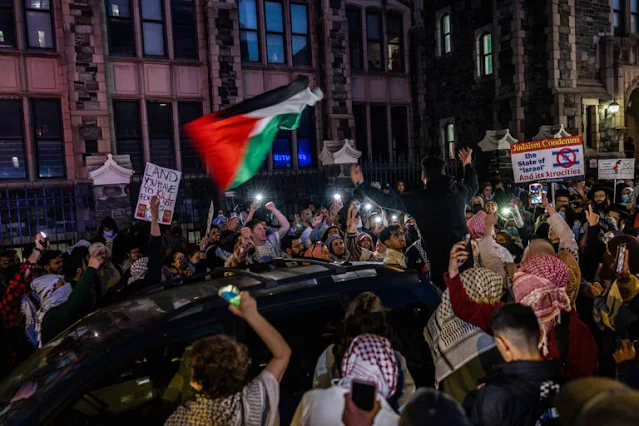WASHINGTON — Seven months after Hamas launched the deadliest attack on Jews since the Holocaust, President Joe Biden faces a significant and closely watched task: delivering a speech at the Holocaust memorial ceremony at the U.S. Capitol.
His address comes seven months before an Election Day where Biden seeks to unite young, Black, Muslim, and progressive voters who helped elect him. However, many of these groups no longer fully support his stance on the Israel-Hamas conflict. Joining Biden at the Holocaust commemoration will be Speaker Mike Johnson, a Louisiana Republican who recently visited Columbia University amidst anti-Gaza war protests and rising antisemitism on college campuses. Biden's challenge is twofold: to ease the concerns of Jewish American voters while acknowledging the disappointment of his base over his continued support for Israel with military aid.
In his speech, Biden will discuss the October 7 Hamas attack on Israel, which resulted in the "deadliest day for Jewish people since the Holocaust" and a surge in antisemitism, according to White House press secretary Karine Jean-Pierre.
The president will address the "horrors of October 7th" and the "alarming rise in antisemitism in the US, our cities, communities, and on our campuses," said Jean-Pierre. Biden's speech will be part of the U.S. Holocaust Memorial Museum's Annual Days of Remembrance ceremony, held the day after Israel's Yom HaShoah (Holocaust Remembrance Day), which commemorates the six million Jews murdered by Nazis during World War II.
On October 7, Hamas killed approximately 1,200 people in southern Israel and took about 250 more as hostages. In the seven months since, Israel's retaliatory attacks have killed over 34,000 Palestinians, according to the Hamas-run Gaza Health Ministry.
The conflict has also led to a humanitarian crisis, with about 1.1 million people in Gaza—half of the population—exhausting their food supplies and coping capacities, facing catastrophic hunger and starvation, according to the UN's World Food Program.
Recent weeks have seen protests over Israel's actions in Gaza spreading across college campuses, with "Gaza Solidarity Encampments" appearing nationwide, demanding an immediate cease-fire. Concurrently, Jewish students report an increase in antisemitism.
Biden's challenge is significant, as he commemorates the largest massacre of Jewish people at a time when Jewish students on college campuses feel unsafe, and key voting blocs accuse Israel of "genocide" against Palestinians in Gaza. Chants of "Genocide Joe has got to go!" have become common at college protests.
Despite an initial deal in November, the U.S. has failed to broker a second deal between Israel and Hamas. Recently, Hamas accepted a cease-fire proposal negotiated in Egypt, surprising the Biden administration.
State Department spokesman Matt Miller stated that the Biden administration is reviewing the Hamas announcement and will discuss its response with partners.
Israel has agreed to dispatch negotiators to Cairo to discuss an agreement. However, Israel has begun striking targets near Rafah, a point of contention between the Biden administration and Israeli Prime Minister Benjamin Netanyahu.
During Monday's White House press briefing, Jean-Pierre emphasized that the president will honor the memory of the 6 million Jews killed in the Holocaust and reaffirm the commitment to the phrase "Never again," stating, "He will speak to the horrors of October 7th, when Hamas unleashed the deadliest day for Jewish people since the Holocaust."
The Anti-Defamation League recorded 732 campus-based antisemitic incidents between October 7 and the end of 2023, a 1,062% increase from the same period in 2022 when only 63 incidents were recorded.
Biden's speech follows former President Donald Trump's accusation that Biden is running a "Gestapo administration," likening it to Nazi Germany, during a private campaign fundraiser. Trump's comments came after he complained about politically motivated indictments against him.
White House spokesperson Andrew Bates stated that the president is focused on uniting Americans, "instead of echoing the appalling rhetoric of fascists, lunching with Neo-Nazis, and spreading debunked conspiracy theories that have cost brave police officers their lives."
Biden must strike a delicate balance, as young Americans are more likely to sympathize with Palestinians than Israelis, according to a Pew report. A Gallup survey also showed that 55% of all Americans disapprove of Israel's military actions, including 75% of Democrats, up from 63% in November.
Stuart E. Eizenstat, chairman of the Holocaust Museum, emphasized the importance of remembering the Holocaust's history and lessons amid rising antisemitism and Holocaust denial, stating, "The combined presence of these leaders is an important statement to our nation at this very challenging moment."

